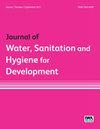生活在孟加拉国达卡贫民窟的残疾女性的讲卫生和健康卫生经历
IF 1.4
4区 环境科学与生态学
Q3 WATER RESOURCES
Journal of Water Sanitation and Hygiene for Development
Pub Date : 2022-10-13
DOI:10.2166/washdev.2022.060
引用次数: 1
摘要
随着人口密度的增加,贫民窟的迅速扩大是孟加拉国达卡特大城市扩大可持续水、环境卫生和个人卫生(WASH)设施的主要障碍。“廉价WASH”(即供水、卫生设施和卫生习惯)的不当安排以及贫民窟对不可生物降解的经期卫生废物、一次性医疗和塑料使用的无管理处置,使城市周围的环境变得不利和脆弱,对公众健康构成巨大威胁。在贫民窟居民中,特别是残疾妇女,由于条件不利和缺乏必要的支助,受影响最严重和最脆弱。在此背景下,本研究有目的地选择了两个达卡贫民窟,有和没有残疾人友好设施,调查女性对残疾女性的WASH和月经卫生管理(MHM)相关的不同方面的看法。在Korail和Kalyanpur贫民窟共进行了30次深度访谈、12次焦点小组讨论和22次关键线人访谈。对孟加拉国首都达卡的个案研究表明,有残疾妇女的家庭的预算赤字增加了经济负担。在厕所设施、MHM教育和交通所需的额外照顾方面存在歧视,忽视照顾者的要求或收入损失被认为是额外的负担。本文章由计算机程序翻译,如有差异,请以英文原文为准。
WASH and MHM experiences of disabled females living in Dhaka slums of Bangladesh
The rapid expansion of slums with increasing population density are the main barriers to scaling-up sustainable Water, Sanitation, and Hygiene (WASH) facilities in the megalopolis of Dhaka, Bangladesh. The improper arrangement of ‘Cheap WASH’ (i.e., water access, sanitation access, and hygiene practices) and unmanaged disposal of non-biodegradable menstrual hygiene wastes, single-use medical, and plastic usage at slums are making the environment of city surroundings unfavourable and vulnerable posing a great threat to public health. Among the slum-dwellers, particularly, females with a disability are mostly the worst affected and vulnerable due to unfavourable conditions and lack of necessary support. Following the backdrops, this study purposively selected two Dhaka slums, with and without disabled-friendly facilities, to investigate female perspectives on different aspects related to WASH and menstrual hygiene management (MHM) for females with a disability. In total, 30 in-depth interviews, 12 focus group discussions, and 22 key informant interviews were conducted at Korail and Kalyanpur slums. Case studies from the megalopolis of Dhaka, Bangladesh, capture the economic burden added to the budgetary deficits of the family with female-disabled. Discrimination in extra care needed for toilet facilities, MHM education, and transport and overlooking the caretaker's requirement or loss in income are found as additional burdens.
求助全文
通过发布文献求助,成功后即可免费获取论文全文。
去求助
来源期刊

Journal of Water Sanitation and Hygiene for Development
WATER RESOURCES-
CiteScore
3.10
自引率
11.80%
发文量
58
审稿时长
16 weeks
期刊介绍:
The Journal of Water, Sanitation and Hygiene for Development is a peer-reviewed journal devoted to the dissemination of high-quality information on the science, policy and practice of drinking-water supply, sanitation and hygiene at local, national and international levels.
 求助内容:
求助内容: 应助结果提醒方式:
应助结果提醒方式:


